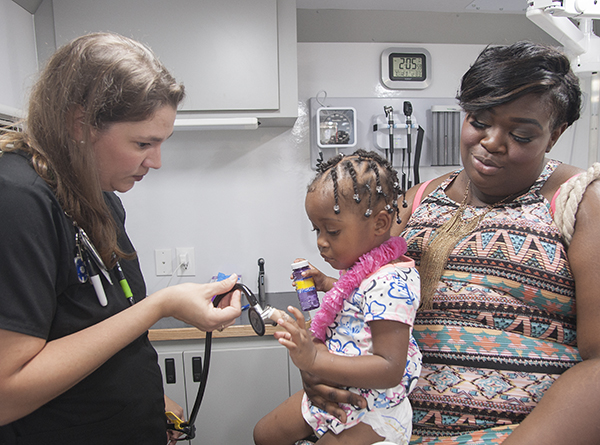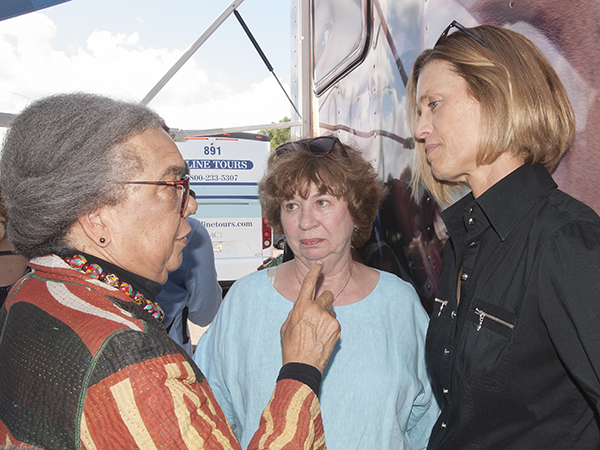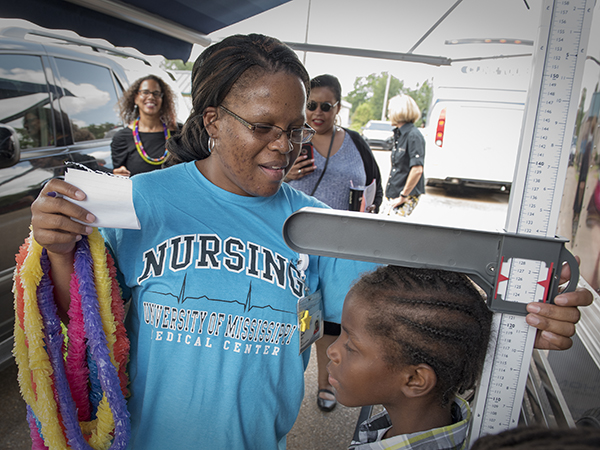School of Nursing delivers care to Delta children most in need

If you’re a kid, sticking your tongue out at a grownup or pushing them away might not be healthy moves.
But it’s OK when you’re doing the bidding of nurses from the University of Mississippi School of Nursing. That’s what they asked 10 children to do -- plus walking like a duck and showing off their muscles – during a health screening Wednesday at Madison Shannon Palmer High School in the tiny Quitman County town of Marks.
“Squeeze my fingers! Oooh, that’s too much!” Josie Bidwell, a nurse practitioner and assistant professor of nursing, told 10-year-old Jamarious Gilliam of Jonestown, who squealed with delight. “Kick me away. Now pull me back!”
A delegation of University of Mississippi Medical School physicians and nurses traveled to the Mississippi Delta as part of a child hunger and poverty tour sponsored by the Children’s Defense Fund and its leader, child health and civil rights activist Marian Wright Edelman.
They supported what the School of Nursing does at its Mercy Delta Express school-based clinics in Sharkey County and at frequent health fairs throughout the state: Give primary health and wellness care to children and adults who may have little to no access to a doctor or other provider.
Among others making the trip: Dr. Kim Hoover, professor of nursing and dean of the School of Nursing; Dr. Tami Brooks, associate professor of pediatrics and medical director of Mississippi Medicaid; Dr. Renate Savich, professor of pediatrics and neonatology and head of UMMC’s neonatal intensive care unit; and Dr. Janet Harris, professor of nursing and the School of Nursing’s associate dean for practice and community engagement.

Also, Dr Lisa Haynie, professor of nursing and director of the School of Nursing’s Mercy Delta Express Project; Dr. Abigail Gamble, assistant professor of preventive medicine and science officer at UMMC’s Myrlie Evers-Williams Institute for the Elimination of Health Disparities; Tammy Fordham Bell, a School of Nursing health educator for Mercy Delta Express; and Gwen Dew, a registered nurse who staffs the clinic at South Delta Middle School in Anguilla.
Bidwell, Haynie and others staffing the School of Nursing’s new UNACARE mobile clinic kept it fun as they tested the children’s strength, reflexes, muscle tone and heartbeat. They checked them for scoliosis, quickly running a hand down their backs as the children touched their toes.
The kids who stepped into the UNACARE van stepped back down wearing a plastic lei and laden with stickers, crayons, a pencil box, bubbles and healthy snacks. Many children in that area, however, have little to smile about because they face serious disease and nutrition issues.
“Students in the Mississippi Delta are facing incredible challenges that significantly impact the concentration and performance of even the best students,” Haynie said. “Abject poverty, single-parent homes, health problems, and issues of abuse, among other things, often cloud the lives of these children.”
With an 11-member health care team, the School of Nursing provides medical, dental and health education services to more than 1,000 children attending South Delta Elementary, South Delta Middle School, South Delta High and Ripley Blackwell Head Start. They fill a critical gap in a region that doesn’t have a pediatrician.
Nearly three in 10 Mississippi children, or almost 30 percent, were poor in 2014 for a total 212,000 children, the Children’s Defense Fund says. Mississippi ranks last in the nation in child food insecurity, or not knowing where your next meal will come from. The state also has the nation’s worst rate of childhood obesity at almost 22 percent.
And without proper education, children are increasingly at risk for sexually transmitted infections.
“Have you talked to your son about STIs?” Bell asked the mom of a preteen. “Have you had that conversation?”
When the child’s mother said no, Bell was ready. “I have some pamphlets for you. They have accurate information,” she said. “Some of the things teens say are so off the wall.”
Preshundra Jones of Lambert brought her three children to the health screening. Although her kids love sweets, she said, they also crave healthy foods including corn, string beans, and all kinds of fruit.
But with her full-time job as a teacher and her husband working 45 miles away in Tunica, Jones said, it’s hard to fit in the 30-40 minute drive to the nearest grocery store.
“The kids have homework to do at night,” she said. “It’s a struggle. Sometimes, I have to run to Dollar General or Fred’s to help with making up a meal before I can get to the grocery store.”

As they recorded the children’s height and weight, the School of Nursing team was also on the lookout for serious health and wellness problems, including proper nutrition and awareness of being improperly touched.
That day, unlike some others, much of what the children told them was cause for cheer.
“If someone tries to pull you away and give you candy, what do you say?” Bell asked Jamaria Jones, 8.
“I say no,” Jamaria declared.
“And who do you run to?”
“My mama!”
And then, Jamaria waved and crossed her arms as she sang something she already knew: The “Don’t Touch” song, ending with: “You can’t touch me anywhere!”

